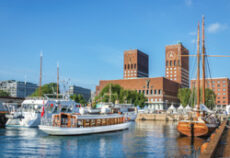
When most people think of capital cities, the first pictures that come to mind are usually of urban sprawl and gritty lifestyles devoid of any connection to nature. That is not the case in Scandinavia, where the vast outdoors is an important part of the culture and worldview. Instead of developing towns to conquer nature, the Nordics have constructed them to blend in with it, and the Norwegian capital is a prime illustration of this.
Therefore, Oslo offers a unique blend of city life and easy access to the wild outdoors. This allows plenty of room for nature to thrive in the midst of the city, and it is this feature of Nordic design that permeates all elements of local culture. Outdoor sports like kayaking, skiing, hiking, and cycling are as popular in the capital as they are in the countryside, and the stylish simplicity of modern Norwegian art and architecture appears to reflect this enjoyment of a simple way of life.
However, this is not to say that Oslo is rough and unrefined. The town has also emerged as a center for modern architecture. In recent years, world-class architects have added modern landmarks, a completely new skyline has emerged, and city development projects that alter existing neighborhoods and create new ones have begun.
The city also has a superb array of sophisticated art galleries and fascinating museums. The National Gallery, for example, houses a diverse collection of works by prominent Norwegian painters, including Edvard Munch’s classic painting The Scream. The Viking Ship Museum teaches visitors about one of the world’s most mythologized civilizations, while the Holmenkollen Ski Jump and Museum offers an exhilarating look at how skiing has influenced Norwegian culture.
The popularity of Scandinavian cuisine is also at an all-time high these days, with three Michelin-starred restaurants in Oslo. Maaemo is the only restaurant in Scandinavia with two Michelin stars. It uses only local, organic ingredients to make traditional dishes from the area.
The 80-acre Vigelandsparken Sculpture Park in western Oslo features 212 sculptures by Gustav Vigeland. Every year over one million locals and tourists visit the park, which is open around the clock daily.
The Oslo Opera House, situated in the Bjørvika neighborhood, is a marble and glass structure that offers award-winning architecture and world-class opera and ballet performances. The roof of the Opera House is available to the public, and walking on it is a popular activity.
The well-known Holmenkollen Ski Jump has recently been refurbished. The world’s oldest Ski Museum and an observation deck with panoramic views of the city are part of the new state-of-the-art ski jump.
The great buildings and museums at this 13th-century stronghold in the city center showcase Oslo’s rich history. The stronghold is also a popular recreational spot with stunning views of the harbor.
The Viking Ship Museum displays Viking ship discoveries from Gokstad, Oseberg, and Tune, as well as additional Viking tomb finds from the Oslo Fjord. The museum houses the world’s two best-preserved wooden Viking ships from the 9th century, as well as miniature boats, sledges, an ornate cart, equipment, tools, harnesses, textiles, and domestic objects.
The National Gallery, founded in 1837, houses Norway’s biggest public collection of paintings, drawings, and sculptures. The Scream and Madonna by Edvard Munch, as well as paintings by Cézanne and Manet, are among the gallery’s main attractions. The permanent exhibition features highlights from the collection as well as national icons from the romantic era through the mid-nineteenth century. International painters and sculptors, especially the French impressionists, are also represented. Princesses, trolls, and other fairy tale creatures from the museum’s wide collections can be found in the Fairy Tale Room. You can try out soft and hard pencils in the new Drawing Room. Gustav Vigeland’s Mother and Child (1907) sculpture has been placed in the center of the room to inspire you.
The Natural History Museum complex, located in eastern Oslo, comprises the Zoological Museum and the Geological Museum. The museum buildings are surrounded by the Botanical Garden, which has 7,500 types of plants from all over the world.
TusenFryd has around 30 attractions, including rollercoasters, kiddie rides, and a water park. Norway’s largest amusement park, open from April to October, is located just 20 minutes south of Oslo.
The world’s most famous polar ship, Fram, is housed in Oslo’s Fram Museum. Visitors can board the ship and learn how Norway’s polar explorers lived and thrived in the world’s harshest areas over a century ago.
The Norsk Folkemuseum, as it is known in Norwegian, is located at Bygdøy in Oslo and is one of the world’s oldest and largest open-air museums. It is open all year and contains 155 ancient structures from all around Norway, including its own old town and a stave church dating back to roughly 1250 AD.